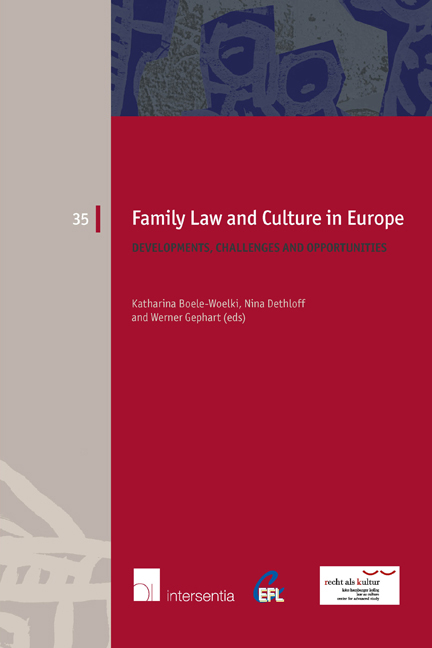Book contents
- Frontmatter
- Preface
- Contents
- List of Authors
- PART ONE THE CEFL PRINCIPLES ON PROPERTY RELATIONS BETWEEN SPOUSES
- General Rights and Duties in the CEFL Principles on Property Relations between Spouses
- Marital Property Agreements
- The Participation in Acquisitions Regime
- The Community of Acquisitions Regime
- PART TWO BREAKUP OF (NON-)FORMALISED RELATIONSHIPS
- PART THREE NEW CONCEPTS OF PARENTAGE
- PART FOUR INTERNATIONAL FAMILY RELATIONSHIPS
- PART FIVE TRANSNATIONAL FAMILIES: ACROSS NATIONS AND CULTURES
- EUROPEAN FAMILY LAW SERIES
General Rights and Duties in the CEFL Principles on Property Relations between Spouses
from PART ONE - THE CEFL PRINCIPLES ON PROPERTY RELATIONS BETWEEN SPOUSES
Published online by Cambridge University Press: 22 November 2017
- Frontmatter
- Preface
- Contents
- List of Authors
- PART ONE THE CEFL PRINCIPLES ON PROPERTY RELATIONS BETWEEN SPOUSES
- General Rights and Duties in the CEFL Principles on Property Relations between Spouses
- Marital Property Agreements
- The Participation in Acquisitions Regime
- The Community of Acquisitions Regime
- PART TWO BREAKUP OF (NON-)FORMALISED RELATIONSHIPS
- PART THREE NEW CONCEPTS OF PARENTAGE
- PART FOUR INTERNATIONAL FAMILY RELATIONSHIPS
- PART FIVE TRANSNATIONAL FAMILIES: ACROSS NATIONS AND CULTURES
- EUROPEAN FAMILY LAW SERIES
Summary
A NEW SET OF PRINCIPLES OF EUROPEAN FAMILY LAW
In 2013, the CEFL finished its Principles Regarding Property Relations between Spouses after more than six years of intensive work. The field of law which has been explored from a comparative perspective is commonly denoted as matrimonial property law. It is a complicated area of the law, which is regulated differently in the European jurisdictions that have been taken into account in CEFL's comparative survey. Moreover, the CEFL took the necessary time to consider every single detail at great length, since we were not under pressure from any organisation. A total of 17 meetings of the Organising Committee and one expert meeting of CEFL experts who wrote a national report were dedicated to the draft ing of this new set of European Family Law Principles. The result is contained in the book which all the participants in the 5th CEFL Conference have received.
This contribution focuses on the rights and duties of the spouses. The relevant Principles are laid down in the first Chapter which can be considered as the general part of the whole set of Principles. Right from the outset it was clear that such a general part would be included and that it would naturally be placed at the beginning of the Principles. The two other Chapters and Sections are subsequently presented in this book by Nigel Lowe, Dieter Martiny, and Frédérique Ferrand.
GENERAL AND SPECIFIC STRUCTURAL ISSUES
The structure of the Principles is clear. Three chapters address all the issues – as far as the CEFL was able to consider – that should be regulated in the field of property relations between spouses. Two matrimonial property regimes have been drafted: the participation in acquisitions and the community of acquisitions.
The whole set entails 58 Principles. Each Principle consists of four elements: the text of the Principle in the English, French and German languages (Principle); an overview of the international and European instruments which regulate the issue addressed in the Principle (international instruments); extensive comparative overviews of the 26 European jurisdictions represented in the CEFL as regards the aspects addressed in each Principle (comparative overview) and motivations, justifi cations and explanations of the content of each Principle (comment).
- Type
- Chapter
- Information
- Family Law and Culture in EuropeDevelopments, Challenges and Opportunities, pp. 3 - 12Publisher: IntersentiaPrint publication year: 2014

